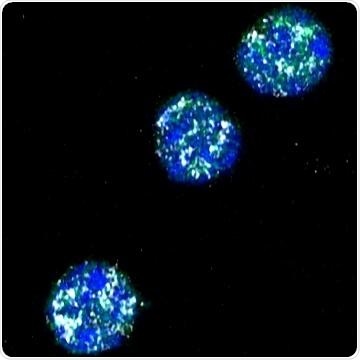Muscle stem cells are the reserve stem cells found in skeletal muscles. They play a crucial role in muscle repair following damage. They are considered “regenerative medicine” to treat muscle damages and muscle diseases.

Researchers from Hong Kong University of Science and Technology revealed quiescent muscle stem cells possess intron retention (white) in their transcriptomes. Image Credit: Hong Kong University of Science and Technology.
When muscle stem cells are in a healthy uninjured condition, they remain in a quiescent or a dormant state to protect themselves. In the event of muscular damage, these cells wake up immediately and contribute themselves to develop new muscles.
If this dormant state is loosely regulated, muscle stem cells are simply wasted when there is no requirement for repair. Similarly, if this dormant state is tightly regulated, the muscle stem cells would not wake up when they are required to contribute to muscle repair.
How the muscle stem cells are able to regulate this balance of quiescence continues to be a topic of prominent interest. Now, a research team from the Hong Kong University of Science and Technology has demonstrated that intron retention (IR) is integral to the mechanism; when the stem cell penetrates the quiescence exit, Dek discharges the preserved introns that enable the cell to become activated.
Using skeletal muscle stem cells, also called satellite cells (SCs), we demonstrated prevalent intron retention (IR) in the transcriptome of quiescent SCs (QSCs). Intron-retained transcripts found in QSCs are essential for fundamental functions including RNA splicing, protein translation, cell-cycle entry, and lineage specification. Our analysis reveals that phosphorylated Dek protein modulates IR during SC quiescence exit.”
Tom Cheung, Team Lead Researcher, Professor, and SH Ho Associate Professor, Hong Kong University of Science and Technology
While Dek protein is absent in QSCs, its overexpression in vivo leads to a global reduction of IR, premature differentiation of QSCs, quiescence dysregulation, and weakened muscle regeneration.
In their IR analysis, the scientists also found scores of public RNA-seq data that demonstrated that IR is preserved among the dormant adult stem cells. This implies that IR acts as a conserved post-transcriptional regulation mechanism that plays a significant role during the stem cell quiescence exit.
The study results were published online in the Developmental Cell journal on June 4th, 2020.
IR has emerged as an important post-transcriptional regulatory mechanism supporting the complexity of gene expression regulation and cell-state transition. We observed around 1,200 genes possessing IR in QSCs, but in many transcripts, only selective introns were retained.”
Tom Cheung, Team Lead Researcher and Professor, SH Ho Associate Professor, Hong Kong University of Science and Technology
“The prevalence of IR among quiescent adult stem cells implies its functional importance in stem cell quiescence. Findings in the study will play a fundamental role in the field as scientists continue the quest to map out the mechanism of stem cell quiescence and stem cell-mediated tissue regeneration,” Cheung concluded.
Source:
Journal reference:
Yue, L., et al. (2020) Dek Modulates Global Intron Retention during Muscle Stem Cells Quiescence Exit. Developmental Cell. doi.org/10.1016/j.devcel.2020.05.006.